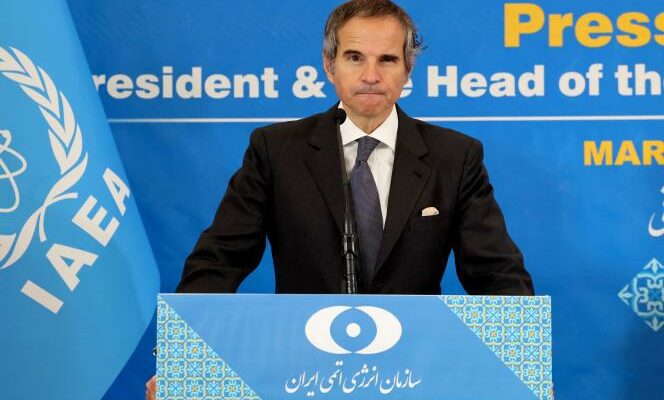The Director General of the International Atomic Energy Agency (IAEA), Rafael Mariano Grossi, on Saturday March 4, welcomed “constructive discussions” with Iran. Iran has agreed to reconnect surveillance cameras at several nuclear sites and to increase the pace of inspections, the IAEA director general said at Vienna airport on Saturday. Rafael Mariano Grossi was returning from a two-day visit to Tehran, where he had talks at the highest level, including one with Iranian President Ebrahim Raisi.
This should be set up ” very soon “after a technical meeting, he said, while the statement issued jointly with the Atomic Energy Organization of Iran (AEOI) remains vague.
In addition, the number of visits by the UN body to the Fordo underground plant, where particles enriched at a level of 83.7%, close to the threshold of the atomic bomb, were recently detected, will be increased by 50 %.
The Islamic Republic had severely limited inspections and disconnected surveillance cameras last year, plunging the IAEA into the dark, in a context of deteriorating relations between Iran and Western powers.
A moribund agreement since 2018
“We have stopped the bleeding of information” available to the IAEA, said Mr. Grossi. In recent months, for lack of sufficient monitoring, the agency had said it was no longer able to guarantee the peaceful nature of Iran’s nuclear program.
“It’s very, very important”, “especially with a view to reviving the agreement” concluded in 2015 in Vienna between Tehran and the major powers to limit Iran’s nuclear activities, in exchange for the lifting of international sanctions against the country.
This agreement (Joint Comprehensive Plan of Action, JCPoA) had been moribund since the withdrawal of the United States, decided in 2018 by their then president, Donald Trump, and because the Islamic Republic gradually freed itself from its commitments. Negotiations had resumed in April 2021 in Vienna between Tehran and the States Parties (China, Russia, United Kingdom, France, Germany and European Union), with the indirect participation of the United States, but they have been blocked since August 2022.
Iran’s total enriched uranium stock thus amounted to 3,760.8 kilos on February 12 (compared to 3,673.7 kilos in October), i.e. more than eighteen times the limit authorized by the JCPoA, based on IAEA calculations.
Test your general knowledge with the writing of the “World”
Discover
Mr. Grossi must then present the results at a board of governors of the IAEA, scheduled for next week. Depending on the progress made, Washington, London, Berlin and Paris will decide whether or not to submit a motion for a resolution blaming Tehran for recent developments in its nuclear program.
